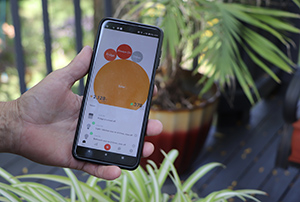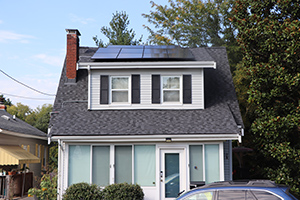
10 ways to increase your home’s curb appeal

PCS moving checklist for military spouses and families

How we did it: Converted to solar power
Chuck Keller pulls up an app on his phone and smiles. At this moment on a sunny September afternoon, the Kellers’ home in Fort Thomas, Ky., is running 100% on solar energy.
“We’re trying to set the example – ‘This is possible; you can do it,’” says Mr. Keller, a retired high-school teacher who chairs the Fort Thomas Forest Conservancy, the local land trust, in his hometown. “We didn’t have to cut down any trees. Now our neighbors are thinking about doing it.”
Keller and his wife, Mary Lou, have lived for 35 years in what was Mrs. Keller’s childhood home. They have two bedrooms, extensive terraced gardens and a bright Southern exposure that works well for solar panels. Keller started seriously thinking about it last year, after becoming acquainted with a Washington-based solar company that is also a sponsor of the Fort Thomas Forest Conservancy.
The solar company first looked at satellite images to determine if their roof was facing the right way and feasible for panels, says Mrs. Keller, a retired accountant. The orientation was favorable, and fortunately they had replaced their aging roof the year before with 50-year shingles. The only downside: They didn’t have much space. They were able to install six, 4x6 panels on the roof - enough to provide, on average, 76% of their home’s power needs.
That means they’re still on the electric grid to cover the rest, but their monthly Duke Energy bill is much lower than it used to be. Checking an app for a monitor the Kellers are using to track their home’s energy use, Mr. Keller can see that his September bill is likely to be about $60, compared to $200 before the solar installation.

Sometimes their panels even produce more power than they need. At those times, the excess goes back to the grid and results in credits on future bills from Duke.
Installation of the panels cost $20,000, and they paid nothing up front. There are many ways for homeowners to finance large scale home improvement projects like this, often involving tapping into home equity. In the Kellers’ case, they said the solar company worked with a partner to offer financing at a 1.3% interest rate. Their current monthly payment is $48 and will go up to $83 next year.
As an incentive to encourage solar conversions, the federal government gives homeowners a credit on taxes owed in an amount equal to 30% of their installation costs. For the Kellers, that should result in a $6,000 reduction in their 2022 tax bill.
Even so, at their age, they’re unlikely to earn back what they paid for the panels, they say.
“But we also know that all decisions have an emotional component,” says Mr. Keller. ‘And we said, ‘It feels right.”

They use their energy monitoring system app to keep tabs on their energy usage and how much is powered by solar versus the grid. They can see that the old fluorescent tubes in their basement are using a lot of power. They can tell how much they save by turning off lights and opening windows instead of using the AC.
It’s educational, and it’s fulfilling.
“We can’t change the world,” Mr. Keller says, “but we can change our part of it.”
- What is the size, shape and slope of your roof, and does it receive sunlight? All of these factors can affect whether solar panels are feasible for you.
- When will your roof need to be replaced? You can potentially save money by replacing your roof and installing solar at the same time.
- How long do you intend to stay in the home? If you’re planning to sell, solar panels may increase your home’s value, but at the same time, there can be complications if you financed the solar equipment with a loan that is still outstanding.
- Get more tips from the homeowners guide to solar from the U.S. Department of Energy.
Thinking of making the leap to add solar power to your home too? Learn more about some possible financing options.
Related content


